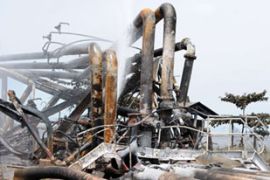Nigeria fighters deny oil raid
Nigerian rebel group denies involvement in attack on Shell pipeline in Niger Delta.

Shell said on Sunday the sabotage had caused some oil to spill into the Niger delta’s creeks and that it was in the process of recovering spilled crude.
| In depth | |||||||||
|
“We are monitoring the situation and will issue a statement [on our investigation of the sabotage] when appropriate,” Lieutenant-Colonel Timothy Antigha from the joint military taskforce responsible for policing the Niger delta, said.
On Saturday Mend called off a three-month-old ceasefire in the Niger delta and threatened to unleash “an all-out assault” on Africa’s biggest oil and gas industry, saying it could no longer trust the government to negotiate demands for greater control of the region’s natural resources.
Mend’s threat to resume hostilities could not have come at a worse time for Nigeria.
Umaru Yar’Adua, the Nigerian president, has been in hospital in Saudi Arabia for more than two months and has failed to formally transfer powers to Goodluck Jonathan, the vice-president, raising fears of a constitutional and political crisis in the country.
Selling out
Shell said on Friday it was selling its stake in three Nigerian onshore oil licences.
The oil company said it remained committed to Nigeria and the move was part of its “active management” of global interests, but some analysts believe the decision will have been coloured by the country’s political environment and continued insecurity.
Peter Voser, the chief executive of the Anglo-Dutch company said recently the company no longer relied on Nigeria for its growth.
Yar’Adua was the driving force behind the amnesty programme last year which saw thousands of armed fighters hand over their weapons.
Community leaders had warned his prolonged absence was stalling the programme and forcing former fighters to re-think their participation.
Attacks by armed fighters and disgruntled community members on Nigeria’s oil sector in the past few years have prevented it from producing much above two-thirds of its capacity, costing the country about $1 billion a month in lost revenues.
